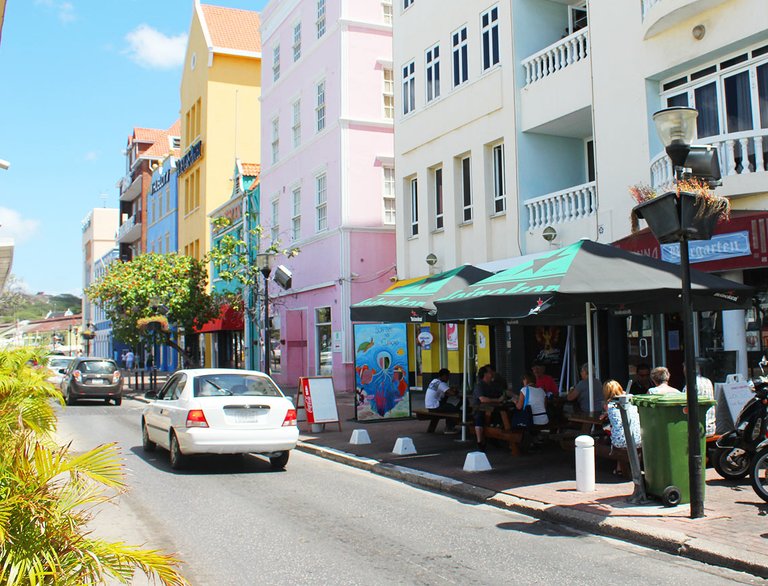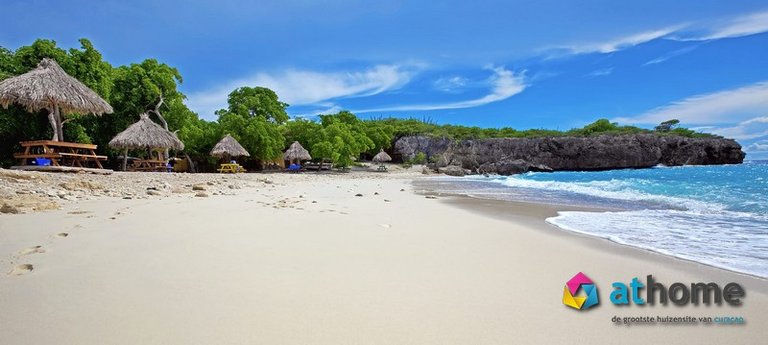 .
.
In this article you will find some common facts about Curacao. Simply simple things like time difference, currency, climate, etc.
Surface Curaçao
The surface of Curaçao is plusminus 450 km2. The length is about 61 kilometers and the width varies from 4 to 15 kilometers. By comparison, the Netherlands has an area of 41,500 km2. Not so big so.
Location Curaçao
Curaçao is located in the Caribbean Sea, about 55 kilometers above Venezuela.
Number of inhabitants Curaçao
There are about 150,000 people living in Curaçao. That is comparable to the number of inhabitants of Arnhem. The vast majority of them live in Willemstad. The population of Curacao is a mix of different nationalities from all over the world.
Official language Curaçao.
The official languages on Curacao are Dutch and Papiamento. In addition, many Spanish and English are also spoken.
Climate Curaçao
Curaçao has a tropical savannah climate. Throughout the year it is delicious around 30 degrees, with over 3000 hours of sunshine a year. From September to December there is a lot of chance of good winds. But after the showers, the sun often returns.
Time difference with the Netherlands
In winter it is 5 hours earlier in Curaçao than in the Netherlands. In the summer it is 6 o'clock earlier.
Payment agent Curaçao
In Curacao they use the Antilles Guilds. In addition, you can also pay with the US Dollar. Currently - February 2015 - 1 US$ is worth about 1,78 guilders.
Curaçao is naturally known for its beaches. Rightly so! Because it's a lot of pearls.
Above but also under water it is beautiful. And there is a beach for everyone to add to his / her wishes. One is calm, the other one is busy, and then you too are too busy. At one you can snorkel beautifully. At the other, you can jump into the water from the rocks. So for all tastes.
And because Curaçao is not that big, you are also from the whole island within 15 minutes on the beach. If there is no file. Because yes, too, it's busy on the road.
There are more than 30 beaches on Curaçao. Unfortunately, these are not all public. So for some beaches you will have to pay entrance fee. But there are also plenty of beautiful beaches where you can go for free.
In this article I'm going to name all those beautiful beaches. Including some of the beautiful pictures. Because the eye also wants something. By clicking on the beaches you will find a separate article with more information about the beach.
BUT, that comes slowly online. So now there are only a few descriptions online, but it will be completed as soon as possible. Because in 2 and a half week I did not visit them all. That was something too much of the good. But not annoyed, by the time I live there I have more than enough time to go all those beaches. And is that information still online.
So, for which no description and information can be found on my site yet! Because I would like to provide information from my own opinion. Use my own photos. And give my own atmosphere impression through a movie. And do not just pick the internet.
The beaches of Curaçao:
Jan Thiel
Mambo / sea aquarium beach
Playa Lagun
Cas abou
Big cut
Small cut
Little Curacao
Blue bay
Porto Marie
Pirates bay
Playa Kalki
Parasasa Beach
Director's Bay
Playa Jeremi
Daaibooi
Caracas Bay
Book Sami
Kokomo beach
Playa kanoa
Baya beach
Playa Forti
Marie Pampoen
Tug Boat
Snakebay
Santa Cruz
Playa Hulu
Playa Santu Pretu
Santa Barbara
Playa piscado
Fuikbaai
Playa hundu
Playa largu
Playa Mansalina
Playa shon mosaic
The beach at the abandoned resort.
Doing business in Curacao - the cost
This really matters to yourself. I heard in advance that it is more expensive than in the Netherlands. But I did not find it expensive at all. Yes, if you want to try your pasta sauce of bertolli, or just do your shopping at the Albert Hein, then you will be more expensive in Curaçao than in the Netherlands.
But if you just eat more local products and go to the local shops, then you do not have to be expensive at all. You can even be a lot cheaper.
Meat is much cheaper there. So you can throw an oyster on the barbecue regularly without having to blow it straight away. Dairy is again more expensive. And I found fruit and vegetables quite different. It depends what you take. Bananas are cheaper there anyway. And tropical fruit too. In the Netherlands I usually pay around 5 euros for a papaya and converted to 1.50. Typical Dutch fruit is again expensive in Curaçao.
Because I do not really eat Dutch, but actually tropical, it is cheaper for me. Actually. Because because they have so many nice things that I do not know yet, I'm probably going to buy a lot more than I need.
Even though Curacao is a small island, you need transport.
Cycling on Curacao
Bicycles are practically not done there. Far too dangerous. There are no bike paths, and I do not recommend cycling on the road. The remaining traffic does not take you into account. There are exceptions, for example, in Jan Thiel there are cycling trails. But it's not like in the Netherlands that you take your bike to go somewhere. You would also get a bit of sweat haha.
Public transport on Curacao
I think this is a tricky point, if I have to tell myself, I would say that it is fine. But I come from a small village where the bus passes 1 hour an hour. If you are used to public transport from the city, Curacao is very close. In any case, do not assume that the buses run on time, because they do not.
Traffic on Curaçao.
The easiest thing is to just drive yourself. If you come to live here, you just need a car. At least, that would make your life a lot easier. If you come here on vacation, I would definitely recommend renting a car.
In Curaçao the main roads are fine. Even though there may be a hole in the road. If you leave the main road, the roads become worse. On some beaches you can only get through a sandpath - full of bumps and holes.
It's great to drive here. Even though you have to take a few things into account.
Right has NO priority, so traffic on the highway always has priority. Except for equivalent crossing points. Then right is a priority.
Just catching left, they have never heard of it, because you're getting caught on both sides. Or through the berm, that can also be normal.
At roundabouts you have priority when sitting on the roundabout. There are a few exceptions, but generally it is well indicated.
Keep away from your predecessor. To indicate direction is not always self-evident. And if, for example, a brake light is broken, that's not really a reason to make that. Or sometimes people suddenly give priority to someone from a side road, and step on the brake. So beware and keep away.
However, it often happens that people with broken lights are driving around. Or they just forgot to do it. So make sure you have a good light so that you can see enough.
And a flashing light wants to say quite little. If people do not indicate direction, that does not mean they go straight. If they indicate direction, they do not want to say they turn off.
Alcohol is just dropped behind the wheel. Just like there are many people with the phone busy in the car. Just keep a little account of this.
Orange does not mean stop. Only when the traffic light is jumping will the people stop. Keep in mind, if you drive away with green light, because someone may drive red. By the way, it is always routed by red, so if you are green you should always look good before heading up the road.
If it rains, it may be mirrored during the first 10 minutes. But then, really mirror-smooth. This is due to the oil lying on the road.
